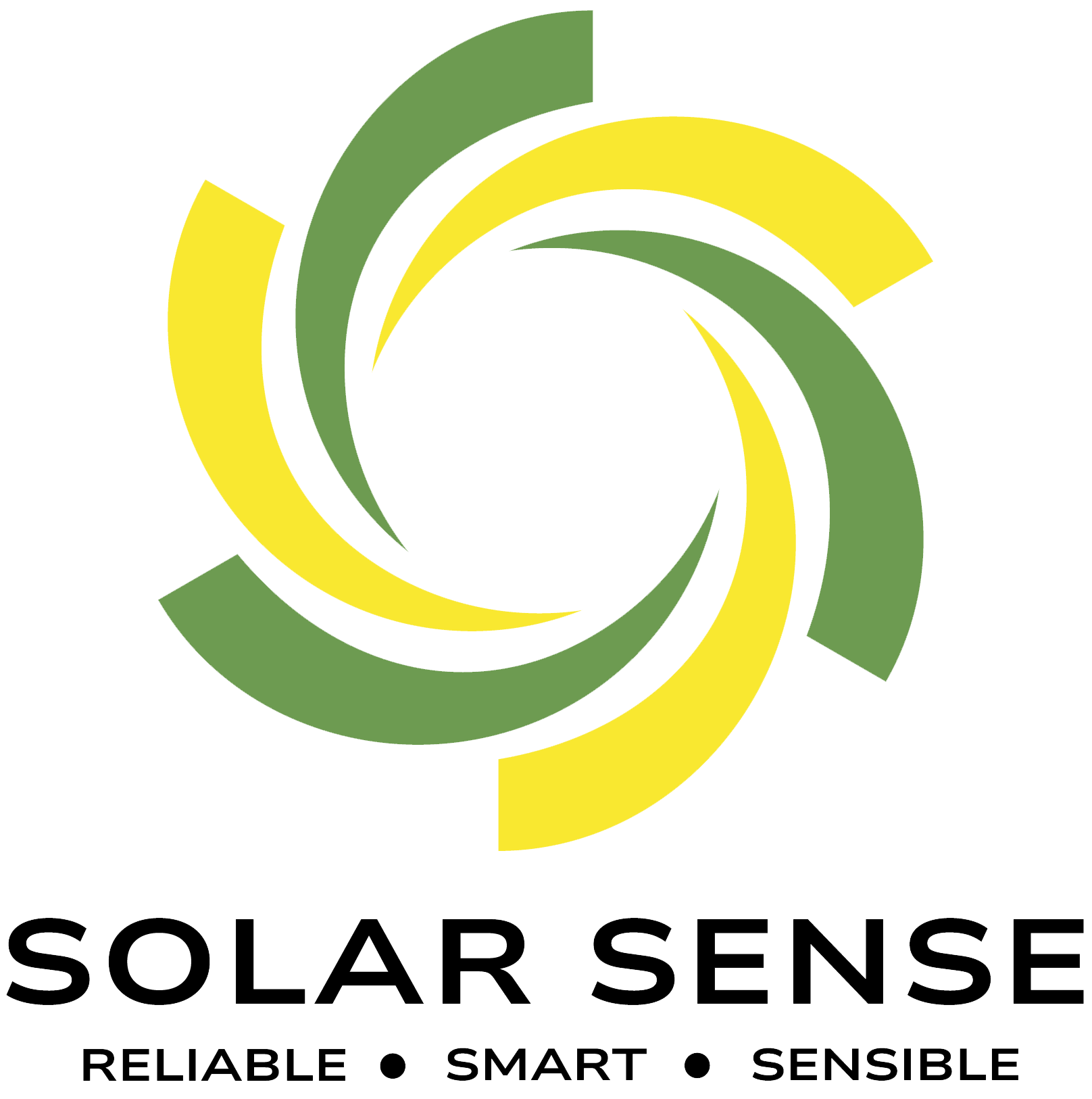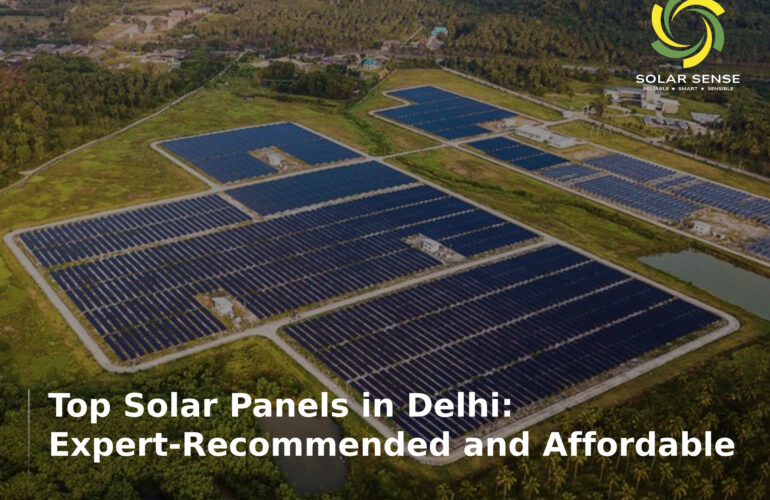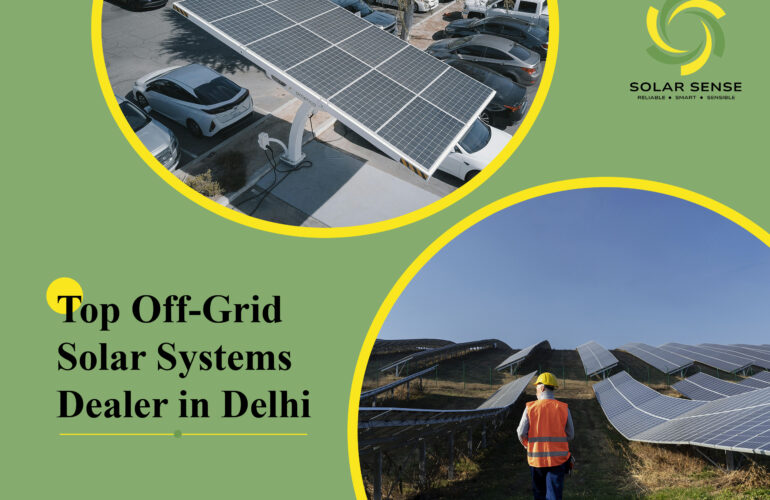Discover the power of solar with Solarsense. As a leading solar panel dealer in Delhi, we offer sustainable, affordable, and efficient solar solutions for your home or business. Reduce your electricity bills, contribute to a greener planet, and increase your property value. Join the solar revolution and experience the future of energy today.
Solar Panel: Utilizing the power of the Sun
Solar panels are devices that convert sunlight into electricity through a process called the photovoltaic effect. They are typically composed of multiple solar cells, which are made from semiconductor materials like silicon. When sunlight strikes the solar cells, it generates an electrical current.
How Solar Panels Work
- Sunlight Absorption: Photons absorb sunlight in solar cells.
- Electron Excitation: Photon energy excites electrons in semiconductor material.
- Current Generation: Eager electrons create electrical currents.
- Energy Collection: Electrodes channel current into usable electricity.
Types of Solar Panels
- Polycrystalline Solar Panels: Made from multiple silicon crystals, they are generally less expensive but slightly less efficient than monocrystalline panels.
- Monocrystalline Solar Panels: Constructed from a single, large silicon crystal, they offer higher efficiency and better performance in low-light conditions.
- Thin-Film Solar Panels: Made from a thin layer of semiconductor material, they are more flexible and can be installed on various surfaces, but they may have lower efficiency compared to crystalline panels.
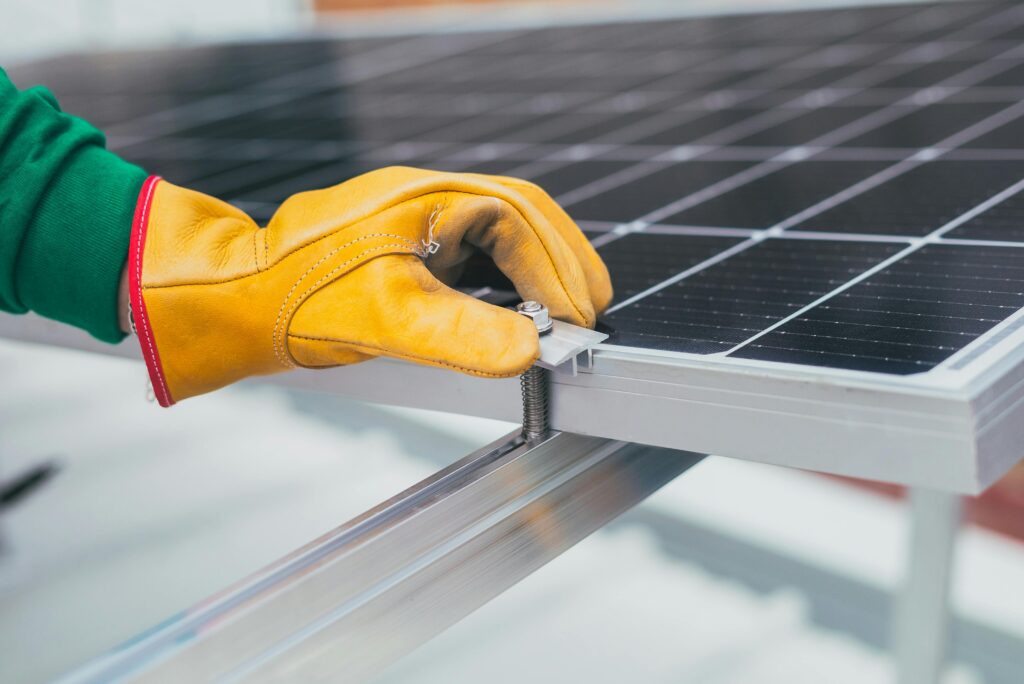
Materials Used in Solar Panels
Silicon, a semiconductor material, is used in solar cells in both polycrystalline and monocrystalline forms. Glass, a protective layer, protects the cells from the elements and enhances their durability. The aluminum frame provides structural support and protects the internal components. The backsheet encapsulates the cells and wiring, protecting them from moisture and environmental factors. A junction box connects the cells and regulates electricity flow. Wiring carries generated electricity to the inverter, which converts DC electricity into AC for home or business use. These materials work together to capture sunlight and ensure efficient solar panel system operation.
Rise of Solar Energy: Growing Demand for Solar Panels
Solar panels have experienced a surge in popularity in recent years, driven by a combination of environmental concerns and economic benefits. These innovative devices convert sunlight into electricity, providing a sustainable and renewable energy source.
- Environmental Benefits: Solar panels contribute to climate change by reducing carbon emissions, promoting clean energy, and supporting sustainable practices, aligning with global efforts to transition to renewable energy sources.
- Economic Benefits: Solar panels can significantly lower electricity bills, with governments often offering subsidies and tax breaks to encourage their adoption. Additionally, solar installations can increase property value.
- Technological Advancements: Modern solar panels offer enhanced efficiency and reduced costs, making solar energy more affordable and versatile, suitable for residential homes and large-scale commercial projects across various settings.
Importance of Solar Panel Dealers
Solar panel dealers play a crucial role in the growing solar energy industry. They serve as intermediaries between manufacturers and consumers, offering expertise, guidance, and support throughout the solar installation process.
Why are Solar Panel Dealers Important?
- Comprehensive Knowledge and Expertise: Solar panel dealers possess in-depth knowledge of solar technology, regulations, and installation best practices. They can provide valuable advice and recommendations tailored to your specific needs and circumstances.
- Product Selection and Customization: Dealers offer a wide range of solar panel options, allowing you to choose the most suitable system based on your energy consumption, budget, and available roof space. They can also customize installation plans to maximize efficiency and minimize costs.
- Professional Installation Services: Reputable solar panel dealers have experienced installation teams that adhere to industry standards and safety guidelines. They can handle the entire installation process, from obtaining permits to connecting the system to your electrical grid.
- Financing Options: Many dealers offer financing plans or partnerships with financial institutions to make solar installations more affordable. They can help you explore different financing options and find the best fit for your budget.
- Ongoing Support and Maintenance: Solar panel dealers provide after-sales support, including maintenance services, troubleshooting, and system monitoring. They are available to address any issues that may arise and ensure the long-term performance of your solar system.
Price of a solar panel
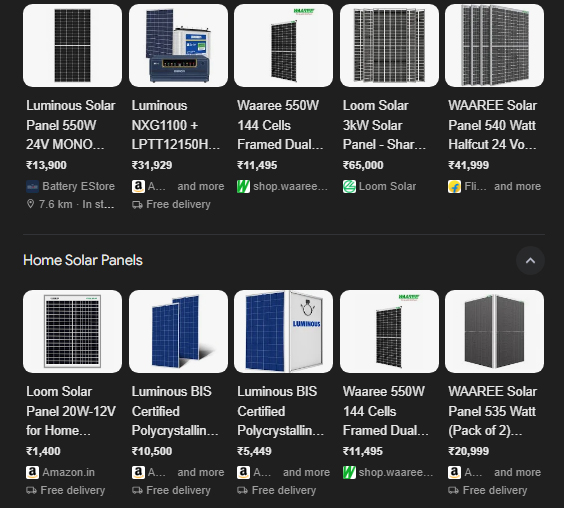
As you can see above, the cost of solar panels varies due to several factors, but the standard price range for basic solar panels is typically between ₹5,000 and ₹10,000.
Factors Affecting Solar Panel Prices
The cost of solar panels can vary significantly depending on several factors:
- Technology: The type of solar panel technology used (e.g., monocrystalline, polycrystalline, thin-film) can affect the price. Generally, higher-efficiency technologies tend to be more expensive.
- Brand and Manufacturer: Renowned brands and manufacturers may command premium prices due to their reputation, quality, and warranty offerings.
- Seasonal Fluctuations: In some regions, solar panel prices may fluctuate slightly with the seasons. For example, during the winter months, when solar panels generate less energy, demand may decrease, leading to potentially lower prices.
- Government Incentives and Subsidies: Government programs and incentives can significantly reduce the upfront cost of solar panel installations. The availability and amount of these incentives vary by region and may influence overall pricing.
- Installation Costs: The cost of installation, including labor, permits, and additional components, can be added to the total price of a solar panel system.
- System Size: The size of the solar panel system, determined by your energy consumption needs, will affect the overall cost. Larger systems typically require more panels and components, increasing the price.
Need Expert Solar Advice? Contact Us Today!
Are you ready to save money on your electricity bills and help the environment? Our team of solar experts is here to help you choose the right solar system for your home or business.
